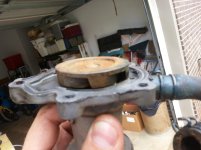MinnesotaEric
Super Member
Best practices on overheating is to Remove and replace the thermostat, get out a machinist's straight edge and check the head for warpage with a feeler gauge (check the block as well).
If you don't know why the engine overheated stuff in the radiator, fan inop, T-stat getting stuck instead of opening all the way (look for little scratches in the brass-if any, you likely found the problem), then pull off and inspect the water pump and check radiator flow (a radiator shop can do this). Consider installing a higher capacity radiator while you're there.
The hearsay I've heard from Bobcat guys is that Kubota heads screw up once they have been overheated and the head needs to be rebuilt every 3,000 hours. If you're nowhere near that many hours, and the head is straight, and your machine shop pressure checked it and found no issues, then slap the head back on with a new gasket set.
Do go above and beyond to try and identify the reason the engine overheated, whether a bad temp switch, or whatever.
If you don't know why the engine overheated stuff in the radiator, fan inop, T-stat getting stuck instead of opening all the way (look for little scratches in the brass-if any, you likely found the problem), then pull off and inspect the water pump and check radiator flow (a radiator shop can do this). Consider installing a higher capacity radiator while you're there.
The hearsay I've heard from Bobcat guys is that Kubota heads screw up once they have been overheated and the head needs to be rebuilt every 3,000 hours. If you're nowhere near that many hours, and the head is straight, and your machine shop pressure checked it and found no issues, then slap the head back on with a new gasket set.
Do go above and beyond to try and identify the reason the engine overheated, whether a bad temp switch, or whatever.

